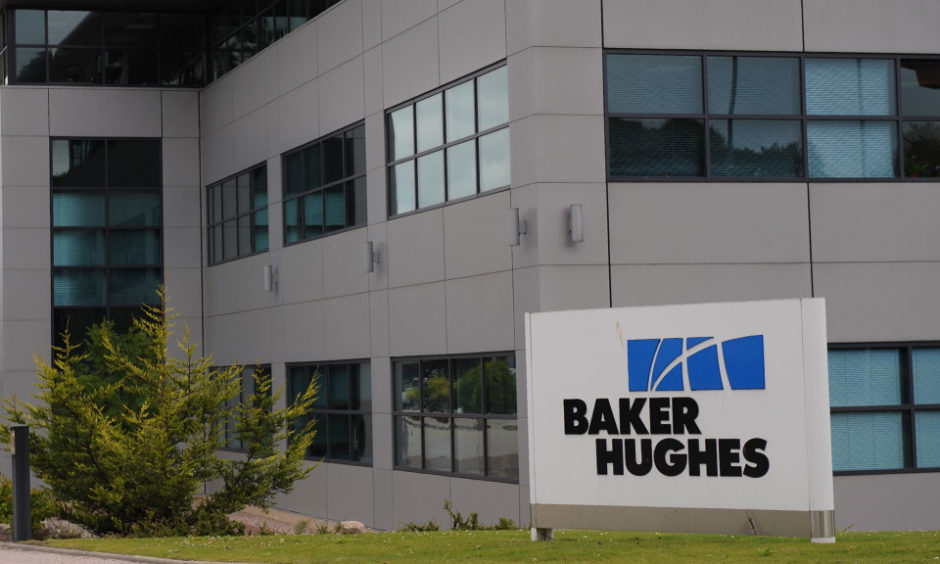
The same day that the $28 billion Halliburton Co.- Baker Hughes Inc. deal collapsed, Lorenzo Simonelli fired off an e-mail to Martin Craighead at Baker Hughes.
The head of General Electric Co.’s oil and natural gas business was reaching out to the chief executive officer of the world’s third-largest oil services company to discuss ways the two could work together, Simonelli said Monday in a telephone interview in which he was joined by Craighead.
At the time, Craighead, 56, was just emerging from a bruising battle to be absorbed by Halliburton, a deal he fought off in a series of public letters until the offer was sweetened. With Simonelli, “we kind of hit it off at the first meeting and things started to take off from there,” Craighead said.
The Baker Hughes CEO’s nearly five-year tenure has largely been consumed with trying to sell the company. His enthusiasm for working with GE contrasts with the testy exchanges he had with Halliburton CEO Dave Lesar. At one point before the ill-fated Halliburton deal was clinched, Craighead released letters in which he expressed disappointment with Lesar’s “complete unwillingness to show any flexibility” on valuing Baker Hughes. He chastised him for “intransigence” and “coercive tactics.”
GE’s deal to combine its oil division with Baker Hughes will create an industry giant with $24 billion in sales next year, the companies said Monday citing analyst estimates. GE will own 62.5 percent of the “new Baker Hughes,” which will be publicly traded. The deal is expected to close in the middle of next year.
When completed, the new operator would become the world’s second-largest oil services and equipment company, based on expected 2017 sales, Andrew Cosgrove, an analyst at Bloomberg Intelligence, said in a phone interview.
Craighead, who joined Baker Hughes in his mid-20s and rose to CEO in 2012, will be vice chairman of the new company, while the 43-year-old Simonelli retains his CEO’s title and GE CEO Jeff Immelt presides over the board. A Pennsylvania State University-trained petroleum engineer, Craighead worked in several of Baker Hughes’ business units, from Latin America to Asia, during his ascension within the company.
Under Baker Hughes’s change-in-control agreements, Craighead is entitled to certain payments even if he doesn’t lose his job in a transaction. Previously-granted equity awards worth about $24.4 million as of Friday’s close could vest ahead of schedule, according to data compiled by Bloomberg. Also, a $17.50-a-share special dividend GE plans to pay could yield him as much as $10.9 million based on his share ownership, which includes unvested restricted stock. The company is also bound to pay any excise taxes he’d be due.
Breakup Fees
Baker Hughes terminated plans to be acquired by the current No. 2 oil services provider, Halliburton, on May 1 after failing to win antitrust approval from regulators. The $3.5 billion breakup fee Halliburton handed over accounted for most of Baker Hughes’s second-quarter profit. GE has acknowledged in the past that it had held talks about possibly bidding for parts of Baker Hughes that Halliburton was seeking to unload for the deal.
If the deal doesn’t go through, GE could face a breakup fee of $1.3 billion, while a penalty for Baker Hughes could be $750 million, according to a note from Cowen & Co. analysts following a briefing from the companies. A GE representative declined to comment.
Immelt, in the same interview with Craighead and Simonelli, said that over the past couple months he and the Baker Hughes CEO met a number of times. They gathered both in Baker Hughes’ home city of Houston and in New York near the headquarters for the industrial-equipment behemoth. They also had some “late-night phone calls,” Craighead said.
By joining forces, Baker Hughes and GE are betting they can compete more effectively with the world’s top oilfield-services provider, Schlumberger Ltd., which recently bought equipment-maker Cameron International.
“We felt like the oilfield service space was a gap in the portfolio,” Immelt said.
Cost Cuts
Oilfield contractors are increasingly forming partnerships to help cut costs and expand their offerings and distribution channels during the oil market downturn. An hour after the GE-Baker Hughes announcement, Nabors Industries Ltd., the world’s largest land-drilling contractor, announced a joint venture with Saudi Aramco to own, manage and operate onshore rigs.
GE and Baker Hughes first started talking earlier this year to see how they could offer a joint technology package that marries GE’s digital prediction operating system with the oil service company’s equipment. They’ve already reached an agreement with a large, onshore natural gas explorer in North America, said Craighead, declining to name the company.
“After the failure of Halliburton-Baker Hughes, I took the opportunity to reach out to Martin and really start to look at ways in which we could collaborate to provide the customers what they were asking for, which was productivity and a lower cost per barrel,” Simonelli said. “What resulted was really an understanding of how the two businesses were very much complementary in the portfolio.”
The positive chemistry between the two companies gives Craighead confidence in the new entity, he said.
“People are finishing each other’s sentences,” Craighead said. “You really can’t tell by the end of the day who’s on what side of the table.”